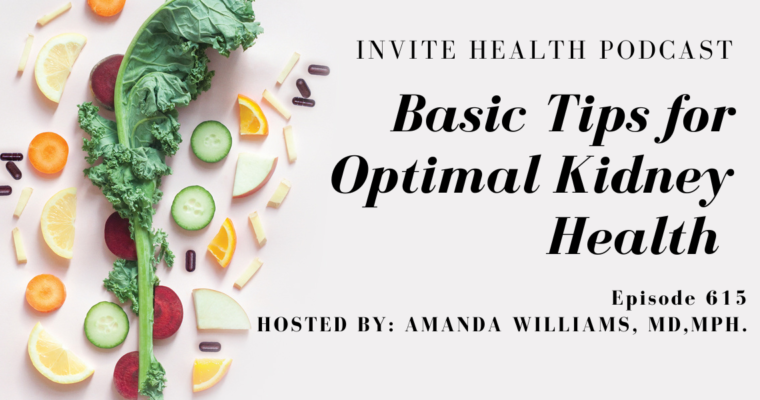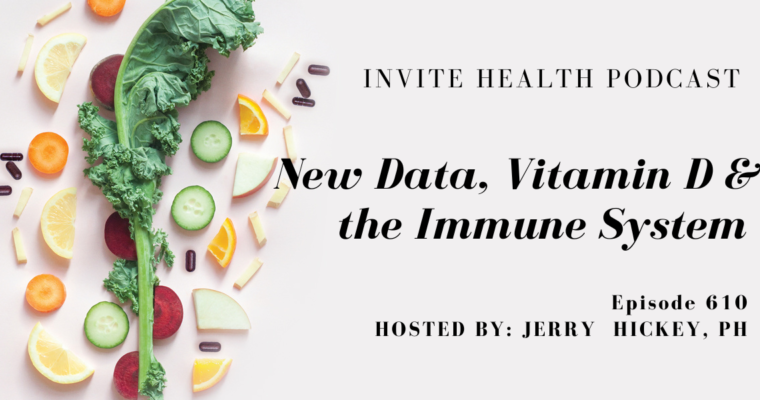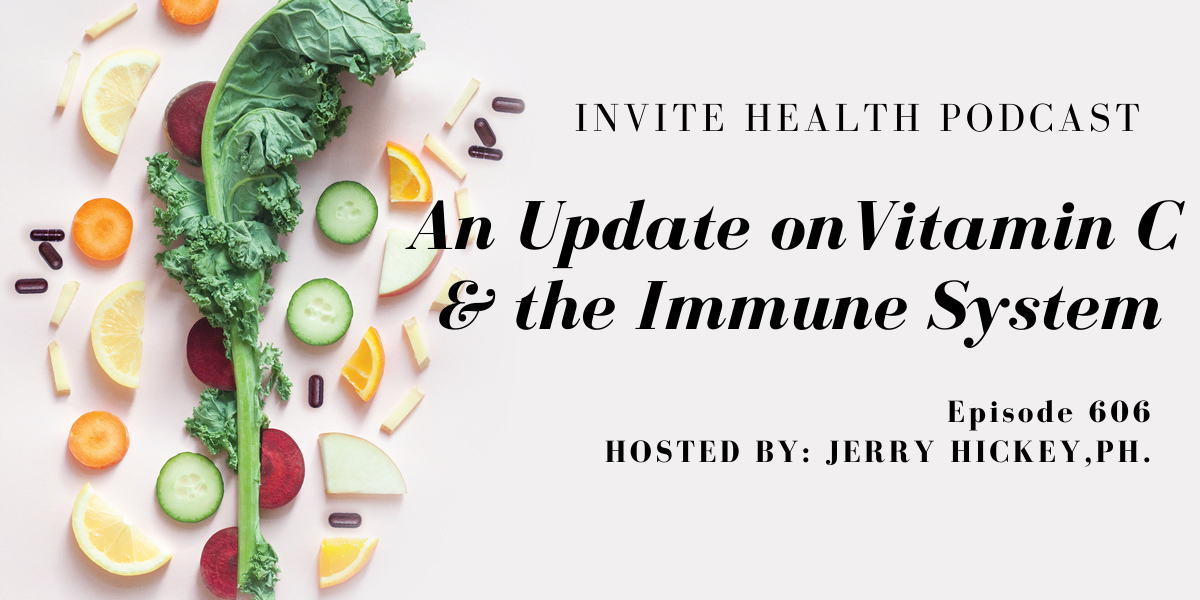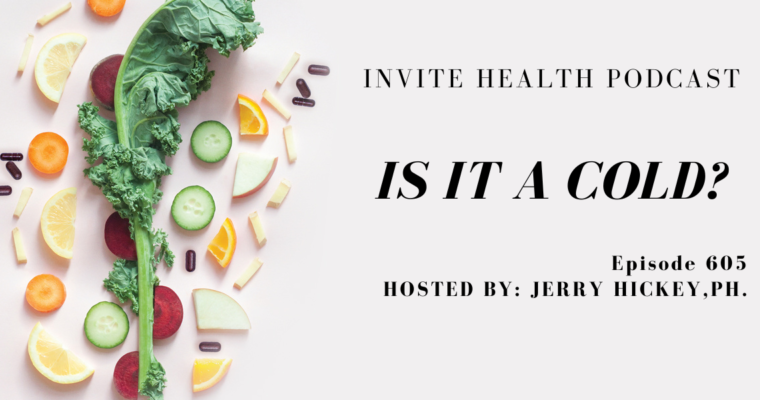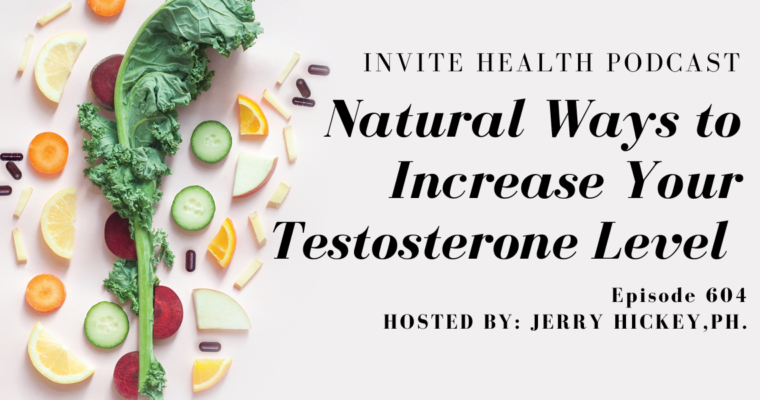Subscribe Today!
Please see below for a complete transcript of this episode.
AN UPDATE ON VITAMIN C & THE IMMUNE SYSTEM, INVITEⓇ HEALTH PODCAST, EPISODE 606
Hosted by Jerry Hickey, Ph.

*Intro Music*
InViteⓇ Health Podcast Intro: [00:00:04] Welcome to the InViteⓇ Health Podcast, where our degreed health care professionals are excited to offer you the most important health and wellness information you need to make informed choices about your health. You can learn more about the products discussed in each of these episodes and all that InVite Health has to offer at, www.invitehealth.com/podcast. First time customers can use promo code podcast at checkout for an additional 15% off your first purchase. Let’s get started.† [00:00:34]
*Intro Music*
Jerry Hickey, Ph: [00:00:41] Vitamin C is such a key nutrient to a well-functioning immune system. It’s been shown to lower the incidence of all types of infections fungal infections, viral infections, bacterial infections. It’s so key to good immune system function. I really think besides a good diet where you’re getting sufficient vitamin C, it’s probably a good idea to take a low dose vitamin C tablet every day, 250 milligrams a day should be enough for prevention for most people. And we’ll get into that. Hi, my name is Jerry Hickey, I’m a nutritional pharmacist, I’m also the scientific director over here at Invite Health. Welcome to my episode. An update on Vitamin C and the immune system. You can find all of the inside podcasts wherever you listen to podcasts for free or just go to, invitehealth.com/podcast and please subscribe and leave a review. You can also find and fight on Twitter, Facebook and Instagram.† [00:01:41]
[00:01:43] So vitamin C, before I read any studies on it, it’s very important for infections. It’s a water soluble vitamin, it’s essential. You need to get it every day. That’s an antioxidant that protects the brain, the eyes, the kidneys, the liver, the heart, tissues all over the body. And that’s recyclable. It keeps on going. You could find it in citrus fruits and tomatoes and berries and bell peppers and broccoli and green tea. But I really think during the winter, certain vitamins, certain minerals, you should get a little bit more of. I happen to take these all year round. Now, what else does vitamin C, do in the body besides help with the immune system? You need it for collagen synthesis, below 11 micro moles per liter, and you have scurvy. You’re not making collagen, collagen is the second most common ingredient in the human body. Number one is water, number two is collagen, you literally melt. You literally fall apart. You need vitamin C for catecholamine synthesis. You know, those things don’t make the brain work properly in the muscles, work properly in the body, work properly in the digestive tract, work properly, things like dopamine. You need vitamin C to create carnitine. Carnitine is sort of an amino acid. It’s very important for energy production and metabolism. And like I said, you need vitamin C for immunity. Now, nutrients in the year 2017 is a good journalism, dependable journal with a vitamin C deficiency. It’s a problem because you can’t store much vitamin C, you have a very low capacity for storing vitamin C, so you need to get it every day. You absolutely need it to absorb from your small intestine. Who would need more? Well, I mean, anybody who’s under a great deal of stress, whether it’s mental or physical or biological diabetics, need more because they very poorly utilize vitamin C, smokers need more because cigarette smoke uses up your vitamin C pollution. If you’re inhaling pollution, it drops your vitamin C levels and during an infection, your vitamin C level drops. So in the Journal of Nutrients with a vitamin C deficiency just three months, what a decreased intake of vitamin C, you develop gingivitis, bleeding gums and same gums. You bruise, you’re fatigued. You have increased risk of infections, especially pneumonia and respiratory tract infections, impaired wound healing. It takes longer to heal a wound. You have just a problem with healing and you have a real problem with your immune system. You have a real serious problem with your immune system. So now let’s go into that.† [00:04:41]
[00:04:45] Again, Nutrients 2017, you need vitamin C for the innate immune system. That’s pretty much the immune system you’re born with practically. And you need vitamin C for the adaptive immune system. Think of your your antibodies that are specific for particular infections. Well, vitamin C is present in very high concentrations. And your immune cells and your neutrophils, these are the most common immune cells and your monocytes and your lymphocytes, your educated immune cells and vitamin C levels drop during an infection. I’ll explain why later. But one of the reasons is that your immune cells need to battle for you. They need to fight for you. And your immune cells, like your neutrophils, have 50 to 100 fold higher concentrations of vitamin C than the surrounding tissues, the surrounding serum. Vitamin C improves chemotaxis, chemotaxis, which is the ability of immune cells to move to the side of an infection. Vitamin C improves phagocytosis. The ability to consume an infection. Vitamin C is needed for the function of B cells and T cells. You know, your lymphocytes that are very smart, they’re like smart missiles that zeroed in on infection, specific infections. You need vitamin C to create your B cells, to create your antibodies, to create your T cells. You need them to increase in number for them to mature and for them to function.† [00:06:13]
[00:06:15] So here is a recent study in the journal Nutrients December 7th, 2020 at the University of Otago in New Zealand, Swansea University in England. The Division of Pulmonary and Critical Care Medicine Eastern Virginia Medical School. That’s a Norfolk, Virginia and Oxford University in England, one of the best universities in the world. And here’s what they found. Vitamin C helps prevent and helps treat COVID 19 infections. That state went through all the data. Vitamin C helps prevent and helps treat COVID infections. So not just preventing, but if you get sick, it helps treat it. Vitamin C helps prevent the common cold. Now, that’s important. There’s hundreds of viruses that cause the common cold. So you never have complete resistance. If you have sufficient vitamin C, you have fewer common cold. A typical healthy adult might have 2 to 4 common colds a year, a typical child 6 to 8. So it’s good to have some vitamin C hanging around in your body. Vitamin C helps prevent pneumonia. Well, that’s pretty good. Vitamin C helps prevent sepsis. That’s when an infection enters your bloodstream. It’s incredibly dangerous, incredibly life threatening. Swallowing Vitamin C, we call that oral. Oral Vitamin C by mouth, 2000 milligrams to 8000 milligrams a day helps reduce the incidence of respiratory tract infections. Now, vitamin C, the higher the dosage, the shorter the time that sticks around the body and the less that’s absorbed all at once. So spread the vitamin C out. So if you’re going to take 2000 milligrams a day, you know, I’ll take 500 milligrams with breakfast, 500 milligrams with lunch and maybe a thousand milligrams with dinner or something like that, spread it out.† [00:08:04]
VITAMIN C REDUCES INCIDENCE OF RESPIRATORY TRACT INFECTIONS
[00:08:06] Vitamin C helps reduce the incidence of respiratory tract infections, but it also, if you have a respiratory tract infection, the vitamin C shortens the length of these infections. Now, this is including most infections, the common cold, the flu, COVID infections, pneumonia, any respiratory tract infection. Now, here’s interesting, something interesting. There’s a limit to how much vitamin C you can get into the bloodstream. So if they want to get a lot of vitamin C into the bloodstream, they give it by intravenous, directly injected into the bloodstream. Intravenous vitamin C reduces mortality and intensive care patients in general and reduces the length of hospital stays. It reduces their duration and people with infections. Intravenous vitamin C reduces the time on a ventilator. That’s really good information for people with COVID or in critical care. And guess what? Vitamin C is safe and it’s not expensive. Just make sure you’re getting a good brand. Now, why does vitamin C help? How much do you need to consume from your food to help with the infection or prevent an infection? How much should you take? I’m going to cover all these points. So let’s keep on going, there’s a lot to say.† [00:09:25]
[00:09:25] This is British medical journal Global Health. It’s January 6th, 2021. It’s Harvard School of Public Health. So here’s what Harvard found, vitamin C reduces the risk of acute respiratory tract infections. You know, you want more evidence than one source. So again and again, there’s all these different, very high quality academic research institutions saying vitamin C has a real impact on infections. So Harvard, Vitamin C reduces the risk of acute respiratory tract infections. These are the severe infections, but it also shortened their duration. It shortened how long a person was sick with a severe infection. So once again, we’re talking prevention and also treating. Now, you’d also want to get some vitamin D and Zinc. Zinc helps cut infection time in half. Vitamin D is a mild preventative, but it has a treatment effect. But vitamin D is very good for protecting your lungs from infections and the consequences of infections like an overly stirred up immune system, so that with Covid. So vitamin C deficiency results with poor immune system function, you get more infections and they’re increasingly more dangerous and they last longer. So is this controversial? It’s only controversial if you don’t read the science thoroughly. Vitamin C’s effect on the immune system. Its effects are real. Its effects are important. But vitamin C’s effects on the immune system are wonderfully, wonderfully complex. Very complex. So now I’m going to go into bit by bit, what vitamin C exactly does specifically does an immune system. So first, let’s discuss neutrophils. Neutrophils are cells we develop early on in life. They’re part of our innate immune system. You’re pretty much born with neutrophils. And approximately 60% of the immune cells that we make in our bone marrow are neutrophils and they’re a first line of protection against infections. Neutrophils are important for preventing and fighting viruses and bacteria and fungal infections so they don’t get out of hand and don’t get dangerous. Neutrophils help fight some cancers also, they release antitumor cytokines. We’ll have to do a separate show on anti-tumor cytokines help kill cancer cells.† [00:12:04]
ICYMI:AN UPDATE ON VITAMIN D AND COVID-19 – INVITE HEALTH PODCAST, EPISODE 497>>LISTEN NOW!
[00:12:06] Now here’s the issue. Neutrophils are our most common, our most plentiful immune cells. They’re all over the body like they’re in the throat and they’re in the urinary tract and they’re in the digestive tract, etc. They’re by the lungs, but they only last a day or less. But it’s not to worry. Our body produces approximately 100 billion new neutrophils every day, and that’s one reason why you want to make sure you get sufficient vitamin C, because you need vitamin C to make neutrophils. So vitamin C helps neutrophils also get to the infection. So if the neutrophil is somewhere else, like in your underarm and you’re developing an infection in your throat or your urinary tract, the neutrophil has to get there to fight the infection. That’s called chemotaxis. That’s called Chemotaxis. The ability of the immune cell to travel to the infection is called Chemotaxis. So here’s how this kind of works. Make believe the infection is in your mouth. The infection damages local cells in your mouth. The infection is damaging cells because it causes inflammation. This damage causes the release of immune system messengers. These are called chemokines and the chemokines call out to the neutrophils. They attract neutrophils to the area, getting to the site of the infection is called Chemotaxis and you need enough vitamin C for Chemotaxis to take place because these immune cells soak up the local vitamin C. Like I said, they’re 50 to 200 times richer in vitamin C, they need the vitamin C to travel to the infection. So when you get the infection and the immune cells are gobbling up too local vitamin C, your vitamin C levels plummet. It’s getting used up, takes them. So now the second question is we know how neutrophils get to the infection chemotaxis. Now how do neutrophils kill the infection? It’s a process called respiratory burst. First neutrophils literally gobble up a virus or bacteria, they literally eat it, it’s called phagocytosis, but they also absorb microbes. This is called pinocytosis, so you could picture it like this. The cell eating the bacteria or virus is called phagocytosis and a cell drinking the bacteria or virus that’s called Pinocytosis, both of these are forms of endocytosis or bringing the infection into the inside of your immune cells. So now the immune cells have traveled to the infection chemotaxis, that requires vitamin C, and then they gobbled up the infection or absorbed the infection. They brought the infection inside the cell. That also requires vitamin C. So now once the neutrophils once the neutrophils absorb the infection, it has to kill the infection. It does this via a process called respiratory burst, neutrophils convert oxygen into singlet oxygen. Oxygen is usually two oxygen molecules join together, which is stable, singlet oxygen is unbelievably unstable. It’s a very powerful, free radical, it’s a solvent, so it could destroy your tissues, too. We’ll get to how vitamin C prevents that. But the, the singlet oxygen literally strips the microbe bare, it’s dissolving the microbe, neutrophils also convert hydrogen, hydrogen and oxygen excuse me. Neutrophils also convert hydrogen and oxygen into hydrogen peroxide. These dissolve the microbe, now vitamin C is needed for a well-functioning respiratory burst. That whole thing absorbing the infection and destroying the infection is called respiratory burst. But guess what? You need to clear out the neutrophils once this is finished. Otherwise the neutrophils start killing healthy cells. You need vitamin C now to clear up the used neutrophils or you’re going to get very inflamed. You have to clear them out of the area once they’re used up.† [00:16:24]
[00:16:25] But now what? See, the cells are releasing these vicious solvents, these vicious free radicals to kill the infection. Otherwise, the infection can kill you. You don’t want these solvents hurting the body. Vitamin C helps prevent this and protects the tissues from the respiratory burst, from the singlet oxygen and from a hydrogen peroxide released by the immune cells. Because it’s a recyclable and powerful antioxidant, it’s used up quickly, blood levels of vitamin C plummet during an infection. You want to take some vitamin C. Now that’s not all, vitamin C also creates barriers. Epithelial barriers, they protect us. They keep infections outside of our organs, outside of our tissues, outside of our bloodstream. So you need vitamin C to create the collagen, to create these cells like your skin, to keep viruses and bacteria on the outside. Now let’s talk about the specialized cells. Vitamin C is needed for these cells to specialize, to differentiate and to proliferate like B cells. B cells are, are, are where we carry our antibodies that are specific for a specific flu or specific coronavirus or a specific bacteria. So vitamin C is needed for these cells to proliferate, you know, to grow a number, to mature, to function. But you also need vitamin C for your T cells, for your T cells to proliferate, to make more of the T cells, for them to differentiate, because the T cells really control the immune system. But they’re it’s a super powerful part of the immune system, there’s killer T cells that kill viruses and bacteria and these T cells can kill cancer cells. And then there’s a controlling T cells and helper T cells, very complex. Vitamin C is needed for all of these to specialize, to be created, to grow in number to really conquer an infection.† [00:18:24]
ICYMI:IS IT A COLD? INVITEⓇ HEALTH PODCAST, EPISODE 605>>LISTEN NOW!
HOW MUCH VITAMIN C IS NEEDED?
[00:18:26] So vitamin C helps prevent and treat both respiratory tract infections and systemic infections. So how much, a prophylactic dosage? Prophylactic means preventative 200 milligrams, to 250 milligrams a day. So I don’t muckle around. I do eat my oranges and my apples and my broccoli and I do my green tea, but I still take 250 milligrams a day just to make sure I’m getting sufficient vitamin C, people who are obese need more because they are inflamed. People who are diabetic need more because they don’t utilize vitamin C properly. I would give any diabetic 500 milligram to a thousand milligrams of vitamin C three times a day, all year round. People exposed to a lot of air pollution need more vitamin C, smokers need more vitamin C. People under extreme physical or mental stress need more vitamin C because vitamin C will be used up inappropriately. Now, if you have an infection, 500 milligrams to 1000 milligrams three times a day with food, does it matter if the vitamin C is natural or not? No, actually it doesn’t. You just have to get it from a good quality company. The vitamin C, the crystalline structure of vitamin C is very easy to replicate by vitamin company manufacturers. Just make sure it’s a nice, clean products. You’re actually getting a vitamin C. In any event, thanks for listening to today’s program. You can find all the invited podcasts wherever you listen to podcasts or for free or just go to, Invitehealth.com/podcast and please subscribe and review, that’s helpful. You can also find Invite on Facebook, Twitter and Instagram at InVite Health. I want to thank you so much for listening today. I hope to see you next time on another episode of InViteⓇ Health Podcast and this is Jerry Hickey signing off. Have a great day.† [00:18:26]
*Exit Music*


